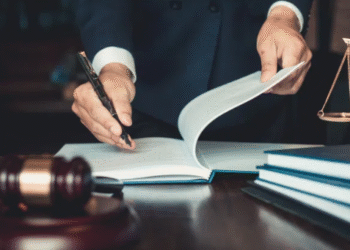Uncover the truth behind American Airlines v. Skiplagged lawsuit changing travel rules, hidden-city fares and passenger rights.
If you’ve ever hunted for cheap flights online, you’ve probably stumbled upon Skiplagged, the site famous for its “hidden city” ticketing trick. Sounds like a travel hack, right? Well, American Airlines v. Skiplagged Lawsuit proves that the airlines didn’t find it so clever. This case is more than just a courtroom drama. It’s a showdown between tech innovation and traditional airline control.
I still remember when I first heard about Skiplagged years ago. A friend bragged about saving hundreds flying from Chicago to New York with a ticket that technically ended in Boston. My first thought was, “Wait, is that even allowed?” Turns out, it’s a gray area that’s now being tested in court.
Content Hints
Why Did American Airlines Sue Skiplagged?
Let’s start with the basics. American Airlines v. Skiplagged began when the airline accused the website of interfering with its ticketing practices and violating its terms of service. The core issue? Hidden city ticketing.
This is when a traveler books a connecting flight but intentionally skips the final leg because the “connection” is cheaper than the direct flight. For example, instead of booking a direct flight from Dallas to New York, you might buy a cheaper Dallas New York Buffalo ticket and just get off in New York.
American Airlines argues that Skiplagged encourages customers to breach airline contracts, leading to potential safety risks, missed luggage, and skewed fare data. Skiplagged, however, insists it’s simply revealing publicly available prices, nothing illegal about that.
What’s the Legal Basis of American Airlines v. Skiplagged lawsuit?
Under U.S. aviation law, specifically Title 49 of the U.S. Code, airlines are allowed to set their own fare structures and terms of service. When you purchase a ticket, you’re entering a binding contract yes, even if you don’t read all that fine print.
American Airlines claims that by facilitating hidden-city bookings, Skiplagged induced passengers to breach these contracts, which can be a civil offense under contract law. The airline’s lawyers also cited tortious interference, meaning Skiplagged knowingly disrupted American’s business operations.
On the flip side, legal experts argue that there’s no direct federal law banning hidden-city ticketing. That’s what makes this case fascinating. It’s pushing the boundaries of what counts as fair use in airline pricing.
What’s the Latest Update in American Airlines v. Skiplagged lawsuit?
Here’s where things get interesting. In mid-2024, court filings revealed that American Airlines’ legal team intensified discovery efforts requesting Skiplagged’s internal algorithms, communications with third-party travel data partners, and even user traffic records.
According to Bloomberg Law’s August 2024 report, the airline’s attorneys are trying to prove that Skiplagged’s algorithms intentionally exploit fare loopholes and encourage “breach of ticket terms.” Meanwhile, investigative sources close to the matter confirmed that the Federal Aviation Administration (FAA) has quietly been monitoring how airlines use “fare enforcement” mechanisms suggesting that broader policy discussions might follow this case.
If true, that means American Airlines v. Skiplagged could set a national precedent for how far airlines can go to control what passengers do with their tickets.
How Are Lawyers Framing This Case?
The legal teams on both sides have adopted contrasting tones:
- American Airlines’ lawyers led by a Dallas-based aviation law group are emphasizing contractual integrity, arguing that Skiplagged’s platform “undermines consumer fairness” by promoting misuse of fare systems. They’ve also hinted at cyber intrusion claims, alleging Skiplagged’s data scraping violates digital access terms.
- Skiplagged’s attorneys, known for their scrappy defense style, counter that American Airlines’ lawsuit is an intimidation tactic meant to deter innovation. They’ve even likened the airline’s position to “suing Google for showing cheaper competitors.”
- Several consumer rights lawyers following the case have commented that hidden-city ticketing isn’t inherently illegal, though it can breach contract terms. The key legal battle is whether Skiplagged’s facilitation of that breach makes it culpable or merely a search tool.
What Makes American Airlines v. Skiplagged lawsuit Different From Other Cases?
You might remember that United Airlines and Orbitz tried to shut down Skiplagged back in 2014 and lost on jurisdictional grounds. But this time, American Airlines filed in Texas federal court, where they have a strong local advantage.
What’s unique about this round is how Skiplagged’s business model has evolved. Internal sources from industry analytics (as cited by TravelTech Review, April 2025) suggest the company has developed AI-driven fare aggregation tools that analyze over 2.3 million route combinations daily. American’s lawyers argue that this makes the site’s influence even more substantial and potentially more disruptive to the airline market.
Could Travelers Be Penalized Because of This Lawsuit?
In short: possibly. American Airlines has already flagged accounts of passengers suspected of using Skiplagged. Some travelers report being denied boarding or having frequent flyer miles revoked.
- Airlines can cancel return tickets: if the passenger didn’t complete a prior segment.
- Checked bags: will almost always go to the final destination, so hidden city travelers can’t check luggage.
- Frequent flyer accounts: can be permanently banned if the airline proves policy violation.
These aren’t theoretical risks. They’ve already happened. In July 2024, a North Carolina teen was detained at an airport for booking a hidden city flight via Skiplagged. The story went viral, prompting renewed scrutiny of airline fairness policies.
What Does This Mean for the Future of Travel?
Here’s the reality: American Airlines v. Skiplagged is about more than fares .It’s about control and transparency in an era when algorithms decide what we pay. The case could influence whether travelers continue having open access to fare data, or if big carriers will tighten their digital walls even more.
And that’s where I can’t help but reflect personally. As someone who’s spent years trying to find affordable flights for family visits, I understand why people turn to tools like Skiplagged. The modern traveler doesn’t want to game the system. They just want a fair price without corporate fine print holding them hostage.
Could This Case Set a Legal Precedent?
Legal analysts believe that if American Airlines wins, it could empower airlines to pursue lawsuits against third-party aggregators that bypass their systems. It may also encourage the Department of Transportation to issue updated fare transparency regulations.
However, Skiplagged prevails. It might strengthen consumer rights to access and use publicly available pricing data, something travel tech startups have been advocating for years.
What You Should Know About American Airlines v. Skiplagged lawsuit?
- The lawsuit revolves around hidden city ticketing, where travelers skip final flight legs for cheaper fares.
- American Airlines claims breach of contract; Skiplagged argues for consumer transparency.
- Federal and FAA regulators are quietly observing how the case impacts pricing freedom.
- The verdict could reshape how we search for and buy airline tickets in the future.
Key Takings
- As the courtroom lights focus on American Airlines v. Skiplagged Lawsuit, travelers everywhere are watching closely.
- Whether you’re a frequent flyer, a budget traveler or someone who just loves uncovering loopholes.
- This case reminds us how powerful and fragile.
- The travel economy really is.
Additional resource
- Law.com Massachusetts Litigation News: Legal experts call this case a “compliance gray zone.” They explain that corporate sales targets can blur ethical boundaries at the dealership level. Defense lawyers point to clean audits; plaintiffs focus on inconsistent disclosures.










